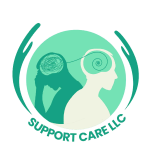
Myth #2: Medication is the Only Answer
While medication can be a helpful component of mental health treatment for some individuals, it’s rarely the sole solution. Therapy plays a crucial role in addressing the underlying causes of mental health concerns and developing coping mechanisms. A combination of therapy and medication can offer the most comprehensive and effective approach to mental health treatment.
Here’s how therapy complements medication:
- Understanding Your Condition: Therapy can help you understand your diagnosis and learn how to manage your symptoms more effectively.
- Developing Coping Mechanisms: Therapy equips you with tools to manage stress, anxiety, and negative thoughts without relying solely on medication.
- Addressing Underlying Issues: Medication often treats the symptoms of mental health conditions, while therapy can address the root causes, leading to long-term improvement.
Mental health treatment has come a long way, but unfortunately, many myths and misconceptions still surround it. These myths can prevent people from seeking the help they need and deserve. Here at Support Care LLC, we’re committed to dispelling these myths and encouraging everyone to prioritize their mental wellbeing.
Let’s take a closer look at some of the most common myths about mental health treatment:
Myth #1: Therapy is Only for People with Severe Mental Illness
This is a big misconception. Therapy can benefit anyone who wants to improve their mental health and well-being. It’s a valuable tool for personal growth, managing stress, developing coping mechanisms, and navigating life’s challenges. Therapy can help you:
- Improve your relationships by enhancing communication skills and fostering healthier dynamics.
- Manage stress and anxiety, equipping you with tools to cope with everyday pressures.
- Boost your self-esteem and develop a more positive self-image.
- Cope with difficult emotions like anger, sadness, and grief.
- Navigate life transitions such as job changes, relationship issues, or loss.
Whether you’re facing a specific mental health condition or simply seeking self-improvement, therapy can be a powerful resource.

Myth #2: Medication is the Only Answer
While medication can be a helpful component of mental health treatment for some individuals, it’s rarely the sole solution. Therapy plays a crucial role in addressing the underlying causes of mental health concerns and developing coping mechanisms. A combination of therapy and medication can offer the most comprehensive and effective approach to mental health treatment.
Here’s how therapy complements medication:
- Understanding Your Condition: Therapy can help you understand your diagnosis and learn how to manage your symptoms more effectively.
- Developing Coping Mechanisms: Therapy equips you with tools to manage stress, anxiety, and negative thoughts without relying solely on medication.
- Addressing Underlying Issues: Medication often treats the symptoms of mental health conditions, while therapy can address the root causes, leading to long-term improvement.
Myth #3: Therapists Can “Fix” You
Therapy is a collaborative process, not a passive experience where the therapist “fixes” you. The therapist acts as a guide and facilitator, helping you explore your thoughts, feelings, and behaviors. Ultimately, it’s your responsibility and effort that lead to positive change. Here’s how to get the most out of therapy:
- Be Open and Honest: Building a trusting relationship with your therapist is crucial. Be open about your experiences, thoughts, and feelings.
- Actively Participate: Therapy requires active engagement on your part. Complete any homework assigned between sessions and be willing to try new approaches.
- Set Realistic Expectations: Therapy is a process, not a quick fix. Be patient with yourself and celebrate small victories along the way.
Myth #4: You Have to See a Therapist Forever
The length of therapy varies depending on your needs and goals. Some people may benefit from short-term therapy to address a specific issue, while others might choose long-term therapy for ongoing support. The important thing is to find an approach that works best for you. Don’t be afraid to discuss your concerns about the duration of therapy with your therapist.
Myth #5: Therapy is Too Expensive
While therapy costs can vary depending on the therapist and location, many options can make it more affordable. Here are some things to consider:
- Insurance Coverage: Many insurance plans offer coverage for mental health services. Check with your insurance provider to see what your plan covers.
- Sliding Scale: Some therapists offer a sliding scale, meaning fees are adjusted based on your income.
- Group Therapy: Group therapy can be a cost-effective option, providing support and guidance while potentially costing less than individual therapy.
Taking Charge of Your Mental Health
Don’t let these myths hold you back from seeking the help you deserve. If you’re struggling with your mental health, know that you’re not alone. Support Care LLC is here to offer understanding, support, and effective treatment options.
Contact us today to learn more about our services and how we can help you on your journey towards better mental health. Remember, prioritizing your mental well-being is an investment in yourself, your relationships, and your overall happiness.
